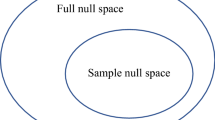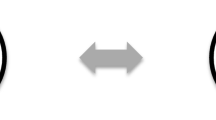Abstract
The formal definition of species as explanatory hypotheses presented by Fitzhugh (Marine Biol 26:155–165, 2005a, b) is emended. A species is an explanatory account of the occurrences of the same character(s) among gonochoristic or cross-fertilizing hermaphroditic individuals by way of character origin and subsequent fixation during tokogeny. In addition to species, biological systematics also employs hypotheses that are ontogenetic, tokogenetic, intraspecific, and phylogenetic, each of which provides explanatory hypotheses for distinctly different classes of causal questions. It is suggested that species hypotheses can not be applied to organisms with obligate asexual, parthenogenetic, and self-fertilizing modes of reproduction. Hypotheses explaining shared characters among such organisms are, instead, strictly phylogenetic. Several implications of this emended definition are examined, especially the relations between species, intraspecific, and phylogenetic hypotheses, as well as the limitations of species names to be applied to temporally different characters within populations.



















Similar content being viewed by others
Notes
Throughout this paper, I intentionally avoid use the more common phrase, ‘shared similarities among members of two or more species.’ As I (Fitzhugh 2005a, 2006b, 2008b) deny that species have the status of class constructs, individuals, or natural kinds, in lieu of being explanatory hypotheses, it would be entirely incorrect to connote some sort of membership relation between organisms and species.
Throughout this paper, formal names of species will be indicated using uninomials, rather than the binomial form required by the International Codes of Nomenclature (e.g., ICZN 1999). As was pointed out by Fitzhugh (2008b), and in this paper, since hypotheses in the categories of species and genus are inferred from entirely different sets of premises applying different theories, the two classes of hypotheses stand separate from one another. The implication is that while the binomial requirement allows for monotypic genera and other taxa, those constructs are, by definition, empirically vacuous as they do not refer to any phylogenetic hypotheses. The solution is to acknowledge that names of species hypotheses should stand on their own, distinct from phylogenetic (supraspecific) hypotheses.
References
Achinstein P (1970) Inference to scientific laws. In: Stuewer RH (ed) Volume V: historical and philosophical perspectives of science. Minnesota studies in the philosophy of science. University of Minnesota Press, Minneapolis, pp 87–111
Atocha A (2006) Abductive reasoning: logical investigations into discovery and explanation. Springer, Dordrecht
Ben-Menahem Y (1990) The inference to the best explanation. Erkenntnis 33:319–344. doi:10.1007/BF00717590
Boyd R (1999) Homeostasis, species, and higher taxa. In: Wilson RA (ed) Species: new interdisciplinary essays. MIT Press, Cambridge, pp 141–185
Caplan AL (1980) Have species become déclassé? In: Asquith PD, Giere RN (eds) PSA 1980, vol 1. Philosophy of Science Association, East Lansing, pp 71–82
Carnap R (1951) Logical foundations of probability. University of Chicago Press, Illinois
Cohan FM (2002) What are bacterial species? Annu Rev Microbiol 56:457–487. doi:10.1146/annurev.micro.56.012302.160634
Curd MV (1980) The logic of discovery: an analysis of three approaches. In: Nickles T (ed) Scientific discovery, logic and rationality. D. Reidel Publishing Company, Dordrecht, pp 201–219
de Queiroz K (1998) The general lineage concept of species, species criteria, and the process of speciation: a conceptual unification and terminological recommendations. In: Howard DJ, Berlocher SH (eds) Endless forms: species and speciation. Oxford University Press, New York, pp 57–75
de Queiroz K (1999) The general lineage concept of species and the defining properties of the species category. In: Wilson RA (ed) Species: new interdisciplinary essays. MIT Press, Cambridge, pp 49–89
Douven I (2002) Testing inference to the best explanation. Synthese 130:355–377. doi:10.1023/A:1014859910339
Fann KT (1970) Peirce’s theory of abduction. Martinus Nijhoff, The Hague
Fitzhugh K (2005a) The inferential basis of species hypotheses: the solution to defining the term ‘species’. Mar Ecol (Berl) 26:155–165. doi:10.1111/j.1439-0485.2005.00058.x
Fitzhugh K (2005b) Les bases philosophiques de l’inférence phylogénétique: une vue d’ensemble. Biosystema 24:83–105
Fitzhugh K (2006a) The abduction of phylogenetic hypotheses. Zootaxa 1145:1–110
Fitzhugh K (2006b) DNA barcoding: an instance of technology-driven science? Bioscience 56:462–463. doi:10.1641/0006-3568(2006)56[462:DBAIOT]2.0.CO;2
Fitzhugh K (2006c) The philosophical basis of character coding for the inference of phylogenetic hypotheses. Zool Scr 35:261–286. doi:10.1111/j.1463-6409.2006.00229.x
Fitzhugh K (2006d) The ‘requirement of total evidence’ and its role in phylogenetic systematics. Biol Philos 21:309–351. doi:10.1007/s10539-005-7325-2
Fitzhugh K (2008a) Fact, theory, test and evolution. Zool Scr 37:109–113. doi:10.1111/j.1463-6409.2008.00338.x
Fitzhugh K (2008b) Abductive inference: implications for ‘Linnean’ and ‘phylogenetic’ approaches for representing biological systematization. Evol Biol 35:52–82. doi:10.1007/s11692-008-9015-x
Fitzhugh K (2008c) Clarifying the role of character loss in phylogenetic inference. Zool Scr 37:561–569. doi:10.1111/j.1463-6409.2008.00338.x
Ghiselin MT (1974) A radical solution to the species problem. Syst Zool 23:536–544. doi:10.2307/2412471
Ghiselin MT (1997) Metaphysics and the origin of species. State University of New York Press, Albany
Godfrey-Smith P (2003) Theory and reality: an introduction to the philosophy of science. University of Chicago Press, Illinois
Griffiths PE (1999) Squaring the circle: natural kinds with historical essences. In: Wilson RA (ed) Species: new interdisciplinary essays. MIT Press, Cambridge, pp 209–228
Hacking I (2001) An introduction to probability and inductive logic. Cambridge University Press, New York
Hanson NR (1958) Patterns of discovery: an inquiry into the conceptual foundations of science. Cambridge University Press, New York
Harman G (1965) The inference to the best explanation. Philos Rev 74:88–95. doi:10.2307/2183532
Hempel CG (1965) Aspects of scientific explanation and other essays in the philosophy of science. The Free Press, New York
Hennig W (1966) Phylogenetic systematics. University of Illinois Press, Urbana
Hull DL (1976) Are species really individuals? Syst Zool 25:174–191. doi:10.2307/2412744
Hull DL (1978) A matter of individuality. Philos Sci 45:335–360. doi:10.1086/288811
Hull DL (1997) The ideal species concept—and why we can’t get it. In: Claridge MF, Dawah HA, Wilson MR (eds) Species: the units of biodiversity. Chapman & Hall, New York, pp 357–380
International Commission on Zoological Nomenclature (1999) International code of zoological nomenclature. The International Trust for Zoological Nomenclature, London
Josephson JR, Josephson SG (eds) (1994) Abductive inference: computation, philosophy, technology. Cambridge University Press, New York
Keller RA, Boyd RN, Wheeler QD (2003) The illogical basis of phylogenetic nomenclature. Bot Rev 69:93–110. doi:10.1663/0006-8101(2003)069[0093:TIBOPN]2.0.CO;2
Lipton P (1993) Inference to the best explanation. Routledge, New York
Magnani L (2001) Abduction, reason, and science: processes of discovery and explanation. Kluwer Academic, New York
Mayden RL (1997) A hierarchy of species concepts: the denouement in the saga of the species problem. In: Claridge MF, Dawah HA, Wilson MR (eds) Species: the units of biodiversity. Chapman & Hall, New York, pp 381–424
Nickles T (1980) Introductory essay: scientific discovery and the future of philosophy of science. In: Nickles T (ed) Scientific discovery, logic and rationality. D. Reidel Publishing Company, Dordrecht, pp 1–59
Peirce CS (1878) Illustrations of the logic of science. Sixth paper. Deduction, induction, and hypothesis. Pop Sci Mon 13:470–482
Peirce CS (1931–1935) Collected papers of Charles Sanders Peirce. In: Hartshorne C, Weiss P, Burks A (eds) vol 1–6. Harvard University Press, Cambridge
Peirce CS (1958) Collected papers of Charles Sanders Peirce. In: Burks A (ed) vol 7–8. Harvard University Press, Cambridge
Psillos S (2002) Simply the best: a case for abduction. In: Kakas AC, Sadri F (eds) Computational logic: logic programming and beyond. Springer, New York, pp 605–625
Reilly FE (1970) Charles Peirce’s theory of scientific method. Fordham University Press, New York
Rieppel O (2006) The PhyloCode: a critical discussion of its theoretical foundation. Cladistics 22:186–197. doi:10.1111/j.1096-0031.2006.00097.x
Rieppel O (2007) Species: kinds of individuals or individuals of a kind. Cladistics 23:373–384. doi:10.1111/j.1096-0031.2007.00152.x
Salmon WC (1984) Scientific explanation and the causal structure of the world. Princeton University Press, Princeton
Salmon WC (1989) Four decades of scientific explanation. In: Kitcher P, Salmon WC (eds) Volume XIII, scientific explanation. Minnesota studies in the philosophy of science. University of Minnesota Press, Minneapolis, pp 3–219
Sober E (1986) Explanatory presupposition. Australas J Philos 64:143–149. doi:10.1080/00048408612342351
Sober E (1994) From a biological point of view: essays in evolutionary biology. Cambridge University Press, New York
Stamos DN (2003) The species problem: biological species, ontology, and the metaphysics of biology. Lexington Books, New York
Thagard P (1988) Computational philosophy of science. The MIT Press, Cambridge
Van Fraassen BC (1990) The scientific image. Clarendon Press, Oxford
Walton D (2004) Abductive reasoning. The University of Alabama Press, Tuscaloosa
Wilkins J (2007) The dimensions, modes and definitions of species and speciation. Biol Philos 22:247–266. doi:10.1007/s10539-006-9043-9
Wilson RA (1999) Realism, essence, and kind: resuscitating species essentialism? In: Wilson RA (ed) Species: new interdisciplinary essays. MIT Press, Cambridge, pp 187–207
Acknowledgments
Sincere thanks are extended to Drs. Francisco Vergara-Silva and Rasmus G. Winther for inviting me to participate in their symposium, “Systematics, Darwinism, and the Philosophy of Science,” held at the Instituto de Investigaciones Filosóficas, Universidad Nacional Autónoma de México (UNAM), Mexico City. I am also very grateful to Drs. Brian Brown and Jody Martin for commenting on an earlier draft of this paper.
Author information
Authors and Affiliations
Corresponding author
Rights and permissions
About this article
Cite this article
Fitzhugh, K. Species as Explanatory Hypotheses: Refinements and Implications. Acta Biotheor 57, 201–248 (2009). https://doi.org/10.1007/s10441-009-9071-3
Received:
Accepted:
Published:
Issue Date:
DOI: https://doi.org/10.1007/s10441-009-9071-3




